#DiabetesCare
Text
#allmydiabetesshit#diabetespouch#diabeticpouch#diabetesawareness#medicalpouch#diabetesgift#funnypouch#medicinecarrier#glucosemachine#glucosepouch#medicineorganizer#glucoseshit#diabeticsupply#diabetesaccessories#diabeteshumor#diabetessupplybag#diabetesorganizer#diabetescare#diabetesmanagement#medicalhumor#medicalgift#medicalaccessory#canvaspouch#zipperpouch#diabeticsupplies#diabeticgift#diabetesmerchandise
1 note
·
View note
Text
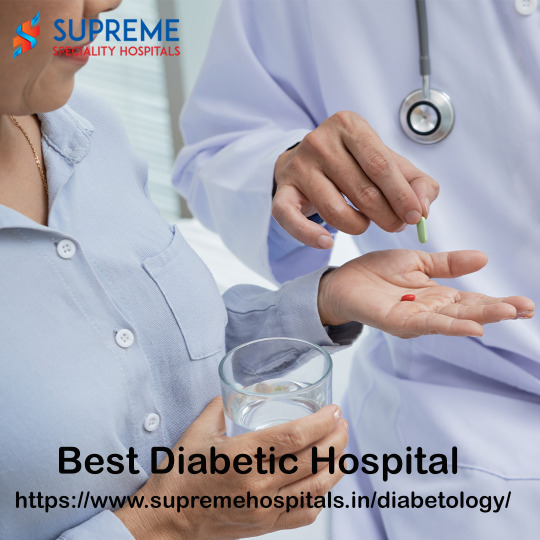
Supreme Hospital - The Best Diabetic Hospital is well known for its state-of-the-art facilities and patient-centered approach. Patients receive comprehensive support in effectively managing their diabetes, with a focus on customised medication plans and lifestyle modifications.
0 notes
Text
Diabetes | Pulmonology | Cardiology | Gastroenterology Treatment Hospital in Navi
Mumbai
Get world-class care for diabetes and gastroenterology at Navi Mumbai's leading hospital. Our experienced team of physicians, nurses, and medical staff is dedicated to providing the best possible treatment for patients with diabetes and gastrointestinal conditions.
For more information : https://mangalprabhu.com/departments/general-medicine/
#DiabetesTreatment#PulmonologyCare#CardiologyHospital#GastroenterologyTreatment#NaviMumbaiHospital#DiabetesCare#PulmonologyTreatment#CardiologyCare#GastroenterologyHospital#NaviMumbaiTreatment
0 notes
Text
Sugar Defender has helped thousands safely assist their blood sugar and drop pounds...
Quickly, easily and from home.
Despite this, I fully understand if you're still uncertain. So to take the risk out of ordering...
Every bottle of Sugar Defender comes with a full 60-day guarantee. You can try it out and see its improving effects on your blood sugar with absolutely no-risk whatsoever!
1 note
·
View note
Photo
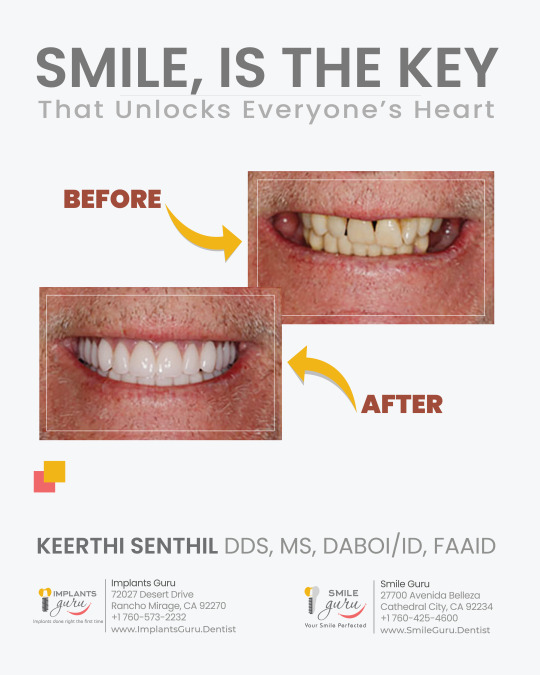
Smile, is the key that unlocks everyone’s heart
Did you know that smiling releases the same feel-good hormones that jogging does?
Failing teeth, bad previous experiences and dentalphobia deterred this patient in receiving the care he needed. Mobile abscessed teeth forced him to choose refined soft foods which aggravated his diabetes. Motivated by his wife’s similar treatment he decided to act.
All his teeth were extracted, implants placed, and bone grafting done in both upper and lower jaws. He was restored with beautiful fixed teeth which he loves!
#OralHealth#DentalPhobia#DentalCare#DentalImplants#BoneGrafting#ToothExtraction#OralSurgery#ImplantDentistry#HealthySmile#DiabetesCare#OralRehabilitation#DentalRestoration#SmileTransformation#PatientSuccess#FearlessSmile#dentistry#drsenthil#smileguru#cathedralcity#california
0 notes
Photo
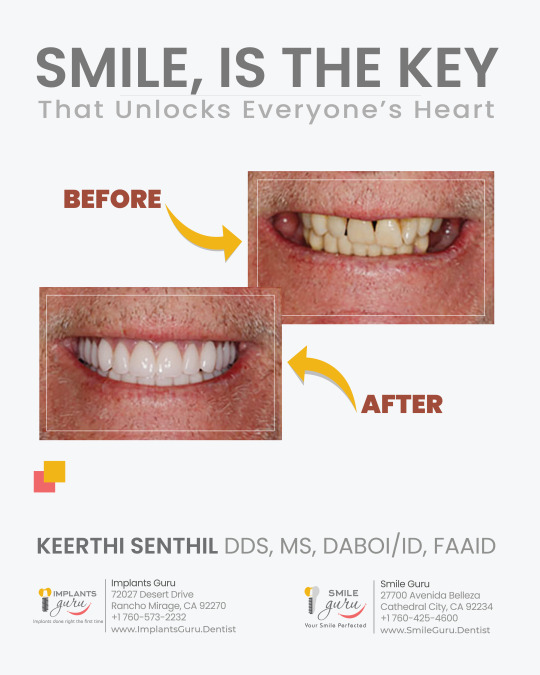
Smile, is the key that unlocks everyone’s heart
Did you know that smiling releases the same feel-good hormones that jogging does?
Failing teeth, bad previous experiences and dentalphobia deterred this patient in receiving the care he needed. Mobile abscessed teeth forced him to choose refined soft foods which aggravated his diabetes. Motivated by his wife’s similar treatment he decided to act.
All his teeth were extracted, implants placed, and bone grafting done in both upper and lower jaws. He was restored with beautiful fixed teeth which he loves!
#OralHealth#DentalPhobia#DentalCare#DentalImplants#BoneGrafting#ToothExtraction#OralSurgery#ImplantDentistry#HealthySmile#DiabetesCare#OralRehabilitation#DentalRestoration#SmileTransformation#PatientSuccess#FearlessSmile#dentalcare#dentistry#drsenthil#implantsguru#ranchomirage#ca
0 notes
Text
Taking charge of your diabetes management begins with understanding your current health status.💪 Our comprehensive diabetes health check-up is designed to provide you with a thorough assessment of your diabetes control, overall health, and risk factors for complications. 🩸
#sriramakrishnahospital#diabetescheckup#healthpackage#diabetescare#coimbatore#hospitalincoimbatore#healthcare#healthandwellness#patientcare#multispecialityhospital#healthylife#healthylifestyle
0 notes
Text
Diabetes Care | Right at Home Fresno, CA
Diabetes can be challenging to manage, but you're not alone. See how Right at Home Fresno works with you to implement your diabetes care plan.
0 notes
Text
Diabetes Care Protein Powder is the Best Natural Solution for Diabetes
Unlocking the Power of Nature: Diabetes Care Protein Powder - Your Ultimate Natural Solution for Managing Diabetes

#DiabetesCare#BloodSugarControl#NaturalSolutions#HealthyLiving#NutritionalSupplements#WellnessJourney#HealthyLifestyle#DiabetesManagement#ProteinPowder
0 notes
Text
Optimal Diabetes Treatment in GA: Navigating Your Health Journey
Living with diabetes requires a multifaceted approach to healthcare, encompassing medical interventions, lifestyle modifications, and ongoing support. For individuals in Georgia, accessing optimal diabetes treatment is essential for managing the condition effectively and improving overall well-being. In this article, we'll explore the diverse range of diabetes treatment in Georgia, empowering individuals to navigate their health journey with confidence and resilience.

Georgia is home to a wealth of healthcare resources, including leading medical centers and specialized clinics dedicated to diabetes care. Institutions like Emory Healthcare, Piedmont Healthcare, and Augusta University Medical Center offer comprehensive diabetes treatment programs staffed by expert endocrinologists, certified diabetes educators, and registered dietitians. From advanced diagnostic testing to personalized treatment plans, patients receive holistic care tailored to their unique health needs and goals.
In addition to conventional medical interventions, holistic approaches to diabetes management are gaining traction in Georgia. Integrative health practices such as acupuncture, chiropractic care, and mindfulness meditation offer complementary therapies to support overall well-being and enhance diabetes self-management. By addressing the physical, emotional, and spiritual aspects of health, these approaches empower individuals to take an active role in their diabetes care journey.
Furthermore, Georgia's diverse cultural landscape has led to the development of culturally sensitive diabetes treatment options tailored to meet the unique needs of different communities. Community health centers and outreach programs provide linguistically and culturally appropriate services to immigrant and minority populations, fostering trust and engagement in diabetes care. By promoting health equity and cultural competency, these initiatives aim to improve health outcomes and reduce disparities among Georgia's diverse population.
Technology also plays a pivotal role in diabetes management in Georgia, offering innovative tools and resources to support patients in their self-care efforts. Telemedicine platforms and mobile health apps connect patients with healthcare providers remotely, facilitating convenient access to care and real-time monitoring of blood glucose levels. Wearable devices such as continuous glucose monitors and insulin pumps empower individuals to track their health metrics and make informed decisions about their diabetes management.
Moreover, peer support groups and diabetes education programs provide valuable resources and encouragement to individuals living with diabetes in Georgia. Organizations like the American Diabetes Association and the Georgia Diabetes Coalition offer educational workshops, community events, and online forums where individuals can share experiences, learn from each other, and find support on their diabetes journey.
In conclusion, navigating diabetes treatment in GA involves exploring a diverse array of services and resources tailored to meet the unique needs of individuals living with this chronic condition. Whether seeking care in urban centers or rural communities, patients have access to high-quality medical services, innovative therapies, and supportive resources to help them manage their diabetes effectively and improve their quality of life. By harnessing the collective expertise of healthcare providers, researchers, policymakers, and community stakeholders, Georgia is poised to lead the way in diabetes prevention, treatment, and management for years to come.
#DiabetesTreatmentGA#GeorgiaHealthcare#DiabetesCare#OptimalHealth#HealthJourney#HolisticWellnessGA#MedicalInnovation#HealthEmpowerment#NavigatingHealth#HealthcareResources
0 notes
Text
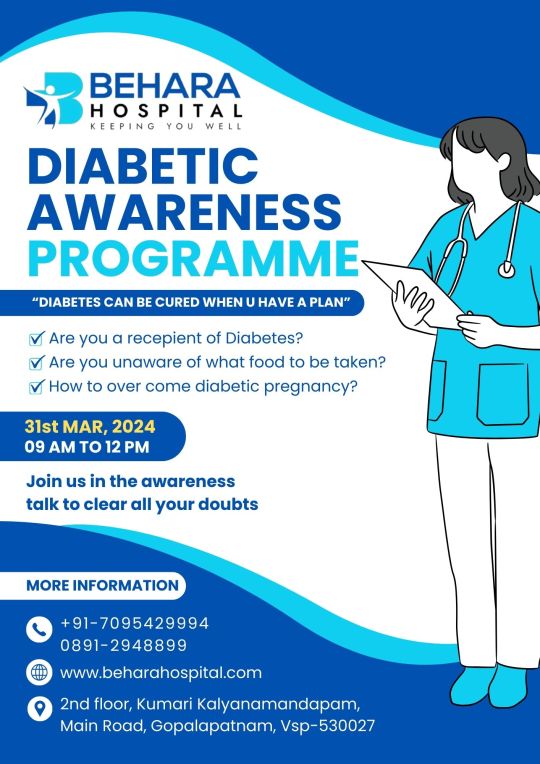
Diabetes is a chronic health condition characterized by elevated levels of glucose (sugar) in the blood. Glucose is a vital source of energy for the body's
cells, and insulin, a hormone produced by the pancreas, helps regulate its absorption into cells.Diabetes awareness, education, and early detection are
crucial for preventing and managing the disease effectively. By promoting healthy lifestyle habits, providing support and resources, and raising awareness
about the importance of diabetes management, we can empower individuals to take control of their health and reduce the burden of diabetes on individuals,
families, and communities.
#DiabetesAwareness#DiabetesCommunity#DiabetesManagement#DiabetesSupport#DiabetesPrevention#DiabetesCare#DiabetesStrong#Beharahospital
0 notes
Text

Struggling with diabetes? Let Punctual Kart's advanced health care devices make your journey easier! From glucose monitors to insulin pumps, we've got everything you need to stay healthy and happy. #DiabetesCare 🩺
0 notes
Text
Maximizing the Impact of Insulin Biosimilars: Strategies for Implementation
Introduction to Insulin and its Role in Treating Diabetes
Insulin is a hormone naturally produced by the pancreas that allows glucose to enter cells and be used for energy. For people living with diabetes, the body either does not produce enough insulin or the cells in the body do not properly respond to the insulin that is produced. There are two main types of diabetes - type 1 and type 2. In type 1 diabetes, the pancreas completely stops producing insulin and patients must receive insulin through alternative means. In type 2 diabetes, the body does not properly use the insulin it produces.
Insulin Biosimilars therapies have come a long way since the discovery of insulin in 1921. A variety of insulin therapies now exist to help people manage their blood glucose levels and minimize health risks from diabetes. Insulin injections remain the primary mode of insulin administration for most patients. Insulin analogs were developed to more closely mimic the body's natural release of insulin and enable better glucose control without wide fluctuations. Insulin pump therapy and continuous glucose monitors have advanced diabetes management by making insulin delivery and glucose monitoring a more continuous process.
Barriers to Accessing Affordable Insulin Therapies
While insulin and associated diabetes technologies have saved countless lives over the past century, access to affordable insulin remains a barrier for millions worldwide. The high list prices for branded insulin products place an enormous cost burden on health systems and out-of-pocket costs on individuals. According to the International Diabetes Federation, in the U.S. alone, the average annual cost of insulin therapy for a patient with type 1 diabetes is over $5,700. Higher out-of-pocket costs are linked to poorer health outcomes, as costs may lead patients to ration or skip doses. This places patients' lives at risk. Limited availability of human insulin in some countries also restricts treatment options. It is clear more affordable options are needed to boost access to the life-saving treatments.
Promising Role of Biosimilar Insulins
In recent years, biosimilar insulins have emerged as a promising means to address the affordability challenge. Biosimilars are biologic medicines that are developed to have no clinically meaningful differences from an existing branded biologic reference product. For insulins, the goal is to create product options that are interchangeable with reference products but sold at a significantly lower price. Unlike generics for small molecule drugs, biosimilars are larger, more complex molecules that require comprehensive clinical evaluation to establish similar efficacy and safety. However, approving biosimilars using an abbreviated pathway can greatly speed market entry compared to originators. This accelerated review allows pricing to be set lower from the start without the massive R&D investments of the innovator product.
Several biosimilar insulin products have now gained approval and initial experience is proving their promise. For instance, Insulin Glargine Biosimilars were priced 15-60% lower than the originator, Lantus. Additionally, mixing and interchangeability trials found biosimilar insulins to be equivalent to reference products when dosed alone or in combination. Greater use of biosimilars could generate vast savings for health systems and patients struggling with insulin costs. As volumes increase across markets, even greater price reductions are expected. Overall, biosimilars appear well positioned to play a major role in improving insulin access globally.
Impact on Diabetes Management and Care Delivery
Widespread adoption of affordable biosimilar insulins could significantly impact how diabetes is managed and cared for. Lower prices may allow more patients to initiate or stay on insulin therapies as prescribed rather than skipping or limiting doses due to costs. This improved adherence could translate to reduced hospitalizations from short-term complications and lower risk of long-term diabetes-related complications that impose enormous medical costs. Greater use of human insulins prescribed by primary care physicians could also shift more management responsibilities to primary care, easing the burden on specialized diabetes clinics and endocrinologists in healthcare systems.
Insurers and pharmacy benefits managers may also establish formularies favoring lower-cost biosimilar insulins over reference products. With assured interchangeability, patients on reference products could be transitioned to biosimilars while maintaining efficacy and safety. Any savings generated could be passed on to lower prices at the pharmacy counter. Manufacturers of reference insulins may also adopt lower list pricing or increase rebates and discounts to maintain market share against competition from biosimilars. Overall, wider use of affordable biosimilar insulins stands to catalyze a system-wide shift toward more cost-effective and sustainable diabetes care globally.
Biosimilar Uptake and Remaining Challenges
While initial experience is positive, ensuring optimal uptake and market penetration of insulin biosimilars will be important to fully realizing their cost-savings potential. Healthcare providers will need education on appropriate substitution and transitioning between reference products and biosimilars. Patients will require reassurance about quality, safety, and efficacy equivalence to be comfortable with a biosimilar product. Manufacturers will have to engage in activities to promote formulary wins over reference products.
0 notes
Text
మీరు ప్రీ డయాబెటిక్ అయితే ఈ 5 నియమాలు పాటించండి…
మీరు ప్రీ డయాబెటిక్ అయితే ఈ 5 నియమాలు పాటించండి…
వ్యాయామం చేయండి
శరీర బరువు నియంత్రించండి
ఆరోగ్యకరమైన ఆహారపు అలవాట్లు
తగు మందులు తీసుకోవడం
క్రమం తప్పకుండా వైద్యుడిని సంప్రదించండి
For Any Appointment Booking:
📅:: https://prathimahospitals.com/book-appointment/
📞:: 733 733 6600 | 733 733 6603
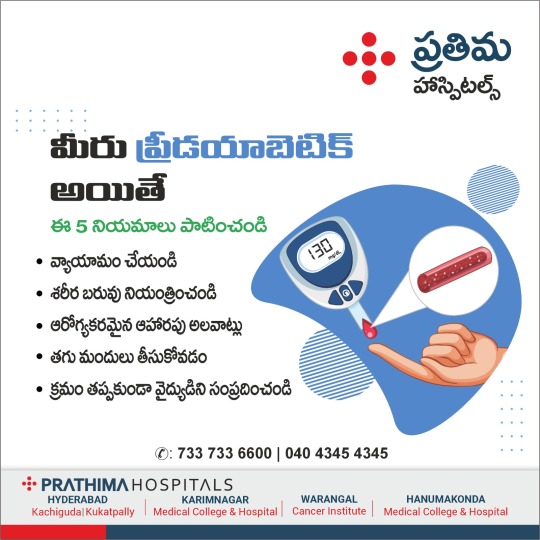
#prathimahospitals#prathima#PH#healthawareness#Diabetescare#diabetes#Diabetesawareness#generalmedicine#Diabetescheckup#life#Surgery#Diabetessurgery#healthcheckup#diabetesdoctor#Generalphysician#besthospitalinhyderabad#besthospital#diabeteshospital
0 notes
Text
Endocrinologist in Lucknow-Dr. Mayank Somani
Dr. Mayank Somani, an accomplished Endocrinologist in Lucknow, is renowned for his expertise in diagnosing and treating hormonal imbalances and disorders. With years of experience and a patient-centric approach, he provides comprehensive care to patients suffering from thyroid issues, diabetes, osteoporosis, and other endocrine-related concerns. As a dedicated professional, Dr. Somani stays updated with the latest advancements in his field to ensure the best possible treatment outcomes for his patients in Lucknow.
Address: Apollomedics Hospital, Kanpur - Lucknow Rd, Sector B, Bargawan, LDA Colony, Lucknow, Uttar Pradesh 226012
Phone: 084290 25275
Website: Visit
1 note
·
View note
Text
Diabetes Mellitus: Types, Causes, Symptoms, Treatment, and Diet – A Complete Overview
What is diabetes mellitus?
The body relies on glucose as an essential energy source for cells in muscles, tissues, and the brain. Insulin, a hormone released by the pancreas, regulates blood glucose levels. However, individuals with diabetes experience either insufficient insulin production by the pancreas or resistance of the body's cells to insulin, leading to elevated blood glucose levels, commonly referred to as high blood sugar.
Types of diabetes include:
1. Type 1 diabetes: Characterized by an absolute lack of insulin production, it's a chronic condition where the pancreas generates minimal or no insulin.
2. Type 2 diabetes: Involves insufficient insulin use and insulin resistance. Initially, the pancreas produces extra insulin, but over time, it becomes inadequate to maintain normal blood glucose levels.
3. Gestational diabetes: Occurring during pregnancy, it involves elevated blood sugar levels in a woman without diabetes, usually resolving after childbirth. More common in the second half of pregnancy.
Diabetes risk factors:
Diabetes risk factors include a family history, obesity, age over 45, sedentary lifestyle, and other conditions like pancreatic diseases or polycystic ovary syndrome. Common symptoms encompass unintentional weight loss, persistent fatigue, blurred vision, excessive thirst, and frequent urination. Complications may lead to heart disease, nerve damage, kidney issues, retinal damage, infections, and hearing impairment. Uncontrolled diabetes poses risks during pregnancy, affecting newborns and pregnant women. Consult a doctor promptly for early detection, especially with increased risk or noticeable symptoms, to manage blood glucose levels and prevent complications. Regular checkups with an endocrinologist are crucial in diabetes care.
Diabetes diagnosis:
Diabetes diagnosis involves a comprehensive assessment by a diabetologist or endocrinologist, considering signs, symptoms, medical history, and physical examination. Tests include HbA1c, fasting plasma glucose, and random plasma glucose. Normal blood sugar levels for those without diabetes range from 70–99 mg/dL (3.9–5.5 mmol/L) fasting and less than 140 mg/dL (7.8 mmol/L) 2 hours after a meal. ADA recommends 80–130 mg/dL (4.4–7.2 mmol/L) for diabetics post-fasting. During pregnancy, fasting sugar should be below 95 mg/dL, and 2 hours after a meal, it should be less than 120 mg/dL. A normal HbA1c level is between 4% and 5.6%, while 6.5% or higher indicates diabetes.read more click on the link below 👇
#health tips#public health#health is wealth#health news#health wealth happiness#healthy diet#healthyeating#heal#selfcare#BloodSugarManagement#DiabetesCare#ExerciseAndDiabetes#HighBloodSugar#InsulinSensitivity#DiabeticDiet#PersonalizedHealth#Type1Diabetes#Type2Diabetes#BloodSugarControl#ManagingHyperglycemia#MedicalAdvice#StressManagement#HealthyLifestyle#DiabetesPrevention
0 notes